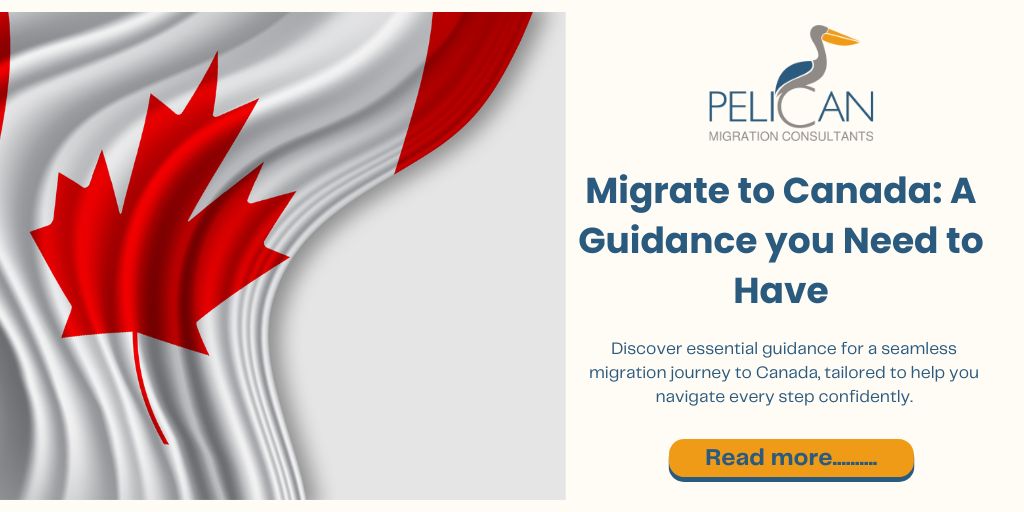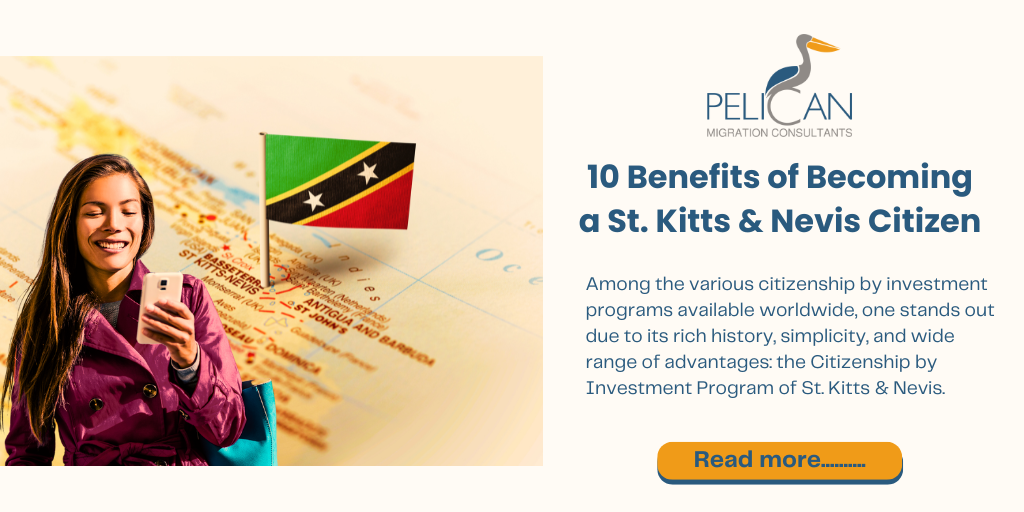
Canada is one of the most sought-after destinations for immigrants due to its diverse society, abundant opportunities, and welcoming policies. Whether you're seeking to build a new career, reunite with family, or experience a better quality of life, Canada offers numerous immigration programs to make this possible. If you want to migrate to Canada explore these key pathways, eligibility criteria, benefits, and application process for migrating to Canada.
Overview of Canadian Immigration Programs
Canada offers multiple immigration pathways to cater to different types of applicants. Here are the main programs you can explore:
Express Entry Program
The Express Entry Program is one of the most popular immigration programs for skilled workers. It’s a points-based system that manages applications for three main economic immigration streams: the Federal Skilled Worker Program (FSWP), Federal Skilled Trades Program (FSTP), and Canadian Experience Class (CEC). Express Entry evaluates candidates based on factors such as age, education, work experience, and language proficiency (in English or French).
Provincial Nominee Program (PNP)
Each province and territory in Canada has its own unique PNP, designed to address specific regional labor market needs. If you have the skills, education, and work experience that meet a particular province’s needs, you can be nominated to migrate to Canada through the PNP. This program often works in conjunction with Express Entry, providing an additional avenue to gain permanent residency.
Family Sponsorship
Canada prioritizes family reunification, allowing Canadian citizens and permanent residents to sponsor their spouses, common-law partners, children, parents, grandparents, and other eligible relatives. This program enables families to live together in Canada and is an essential part of the country’s immigration policy.
Caregivers Program
This pathway allows individuals to come to Canada and work as caregivers, providing care to children, elderly individuals, or those with medical needs. The Caregivers Program also offers an option to apply for permanent residency after gaining relevant work experience.
Atlantic Immigration Program (AIP)
The AIP is tailored to facilitate immigration to Canada’s Atlantic provinces, including New Brunswick, Newfoundland and Labrador, Nova Scotia, and Prince Edward Island. It is designed for individuals who either graduated from an institution in these provinces or have job offers from designated employers in the region.
Quebec-Selected Skilled Workers Program
The province of Quebec has its own distinct immigration policies. Those interested in moving to Quebec can apply as a skilled worker through the Quebec-Selected Skilled Workers Program, which emphasizes French language skills and regional integration.
Start-up Visa Program
This program is intended for entrepreneurs looking to establish a business in Canada. To qualify, applicants must secure funding from designated organizations and demonstrate their ability to create jobs for Canadians.
Agri-Food Pilot
If you have experience in specific agri-food industries, such as meat processing, mushroom production, or livestock farming, the Agri-Food Pilot can provide a pathway to permanent residency.
Francophone Immigration
This pathway is intended for French-speaking individuals who want to live and work outside Quebec. The aim is to enhance the Francophone communities throughout Canada.
Refugees and Humanitarian Programs
Canada also provides refuge to people fleeing persecution, war, or natural disasters. Additionally, family-based humanitarian programs allow residents to sponsor their relatives from certain countries.
A basic conception on immigration programs can make your process to migrate to Canada easy.
1. Eligibility Criteria for Canadian Immigration
Before applying, it’s crucial to understand the eligibility requirements for migrating to Canada. While each program has its own specific requirements, here are some general conditions:
2. Work Experience and Occupation
Most economic immigration programs require applicants to have work experience in a recognized occupation. For instance, the Express Entry Program requires at least one year of full-time experience (or an equivalent amount of part-time experience) in an occupation listed in the National Occupation Classification (NOC).
3. Language Proficiency
Applicants need to demonstrate their language skills in either English or French by taking a recognized language test, such as the IELTS (for English) or TEF (for French). A minimum score must be achieved, depending on the program.
4. Education
Candidates are often required to have their educational credentials assessed to determine their equivalency to Canadian standards. Higher educational qualifications generally lead to a better ranking in points-based systems like Express Entry.
5. Proof of Funds
Applicants must show they have sufficient funds to support themselves and their families once they arrive in Canada. The amount required varies based on family size and the program through which you are applying.
6. Security and Medical Checks
Applicants must pass background checks and medical examinations to ensure they are not a security risk or carrying infectious diseases. This is a standard requirement across all programs.
7. Additional Requirements
Some programs may have additional criteria, such as job offers from Canadian employers, specific age limits, or intent to reside in certain provinces.
Benefits of Migrating to Canada
If you want to migrate to Canada, you should firstly know the benefits of the migration. Migrating to Canada offers a range of benefits, making it an attractive destination for individuals and families. Some of the main advantages include:
1. A High Standard of Living
Canada consistently ranks high in terms of quality of life, offering a clean and safe environment, excellent healthcare, and top-notch educational facilities. Immigrants can enjoy a balanced work-life environment and live in cities renowned for their beauty and infrastructure.
2. Healthcare for All
One of the primary benefits of moving to Canada is access to a public healthcare system. Permanent residents are entitled to receive medical care at little to no cost through government programs.
3. Family-Friendly Policies
Canada values family unification and has created various programs to ensure that families can live together. Children under the age of 18 receive free public education, and there are numerous social services to support families.
4. Path to Canadian Citizenship
Once you have permanent residency, you can apply for Canadian citizenship after fulfilling residency requirements. Canadian citizens enjoy numerous benefits, such as the right to vote and the ability to obtain a Canadian passport.
5. Economic Opportunities
Canada’s growing economy provides ample job opportunities, and its multicultural workforce welcomes diversity. The country also supports entrepreneurs and start-ups through various initiatives, making it a great place to start a business.
The Process of Applying for Canadian Visa
If you’ve decided to migrate to Canada, understanding the visa application process is essential. Here’s a step-by-step overview of how to apply for a Canadian visa:
Step 1: Check Your Eligibility
Use the official Canadian immigration tool to find out if you meet the requirements for a specific immigration program. Checking your eligibility is the first and most crucial step.
Step 2: Create an Online Account
You’ll need to create an account to apply online. This account allows you to manage and track your application throughout the process.
Step 3: Gather Required Documents
Depending on the visa program, you’ll need to submit various documents, including:
- A valid passport
- Proof of funds
- Educational credential assessments
- Job offer letters (if applicable)
- Language test results
- Medical exam results
- Police certificates
Step 4: Pay Fees
Application fees and biometric fees must be paid as part of the process. These fees are non-refundable, making it essential to know the exact amount needed for your particular visa type.
Step 5: Submit the Application
You can submit your application online or in person at a Visa Application Centre (VAC). Online submission is often the most convenient option, but you can choose based on your location and preferences.
Step 6: Wait for Processing
The processing time differs based on the visa type and the volume of applications received. It’s essential to track your application through official channels such as the VFS Global portal.
Step 7: Receive Your Visa
Once your application is approved, your visa will be issued and included in your passport. You’ll also receive important information regarding your arrival in Canada.
Specific Immigration Pathways: Additional Considerations
There are also specific immigration pathways for special circumstances and targeted groups:
Economic Mobility Pathways Pilot
This program aims to provide skilled refugees an opportunity to gain permanent residence through existing economic immigration programs, thereby integrating into Canada’s workforce.
Out-of-Status Construction Workers
This pathway is designed for construction workers in the Greater Toronto Area who do not have a valid immigration status but meet other conditions to apply for permanent residency.
Permanent Residence Pathways for Hong Kong Residents
Canada offers two pathways to permanent residency for eligible residents of Hong Kong currently in Canada. These pathways aim to support those who have studied or worked in Canada.
Humanitarian Programs for Latin America and the Caribbean
There are family-based humanitarian programs for residents of Colombia, Haiti, and Venezuela. This program allows family members living in Canada to sponsor their relatives facing difficult conditions back home.
Appealing an Immigration Decision
If your immigration application is refused, you have the right to appeal to the Immigration and Refugee Board. Appeals can be made in cases involving sponsorships, residency obligations, or removal orders.
Your Pathway to Migrate to Canada with Pelican Migration Consultants
If you are considering the opportunity to migrate to Canada, Pelican Migration Consultants is here to guide you through the process. As one of the best Canada immigration consultants in Dubai, we are fully licensed by CICC (R507572), ensuring that your chances of securing permanent residency are maximized.
We understand that immigration can be complex and daunting, which is why our expert team is committed to providing personalized service tailored to your unique circumstances. We’ll analyze your profile to determine your eligibility and advise you on the best pathways to achieve your goals. Our years of experience mean that we know how to navigate the nuances of the immigration process effectively, so you can focus on your future.
With permanent residency in Canada, you’ll gain access to healthcare, social benefits, and a world of opportunities in a welcoming and diverse country. At Pelican Migration Consultants, we pride ourselves on our ability to meet the diverse needs of clients from across the Middle East. We are dedicated to helping you overcome challenges and find the right solutions for your immigration journey.
Start your journey towards a new life in Canada today. Contact Pelican Migration Consultants today to schedule a consultation and receive a thorough assessment of your situation. Let us help you make your dream of migrating to Canada a reality!
End Note
Canada offers a wealth of opportunities and a welcoming environment for those looking to build a better future. With various immigration pathways tailored to diverse needs, it's easier than ever to find a suitable route to permanent residency. By choosing to migrate to Canada, you can enjoy a high standard of living, access to excellent healthcare, and a supportive community. Start your journey today and take the first step toward realizing your dreams in this vibrant country.
Frequently Asked Questions
1. What are the main immigration programs available in Canada?
Canada offers several immigration programs, including the Express Entry Program, Provincial Nominee Program (PNP), Family Sponsorship, Caregivers Program, and Start-up Visa Program, among others.
2. How do I determine my eligibility for Canadian immigration?
You can assess your eligibility by reviewing the specific requirements of each immigration program on the official Canadian immigration website or using their eligibility assessment tool.
3. What language proficiency is required for immigration?
Applicants must demonstrate proficiency in English or French through recognized language tests, such as IELTS for English or TEF for French, achieving a minimum score as specified by the immigration program.
4. Is there a pathway for family members to migrate to Canada?
Yes, the Family Sponsorship program allows Canadian citizens and permanent residents to sponsor their spouses, children, parents, and other eligible relatives to join them in Canada.
5. What is the processing time for Canadian visa applications?
Processing times vary based on the type of visa and the volume of applications. It's important to check the official website for current processing times for your specific program.
6. Can I apply for Canadian permanent residency without a job offer?
Yes, it is possible to apply for permanent residency without a job offer through programs like Express Entry or the PNP, depending on your qualifications and skills.
7. What benefits do I receive as a permanent resident of Canada?
Permanent residents in Canada enjoy access to healthcare, social services, and the opportunity to apply for Canadian citizenship after meeting residency requirements.
8. How can Pelican Migration Consultants assist me in my immigration journey?
Pelican Migration Consultants provide expert guidance through the immigration process, helping assess your eligibility, advising on the best pathways, and assisting with documentation and application submission.


